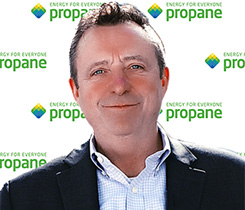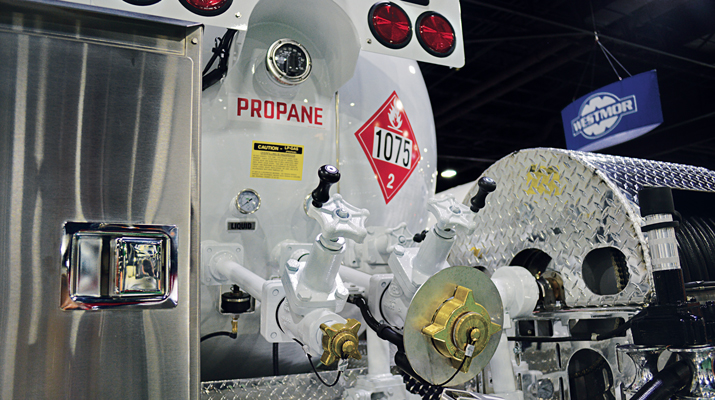A Propane Profile: Roush CleanTech’s Todd Mouw
Todd Mouw’s tenure at Roush spans about 10 years.
He currently serves as vice president of sales and marketing at Roush CleanTech, a Livonia, Michigan, company that helps commercial fleets convert their vehicles to run on propane autogas.
Mouw spends much of his time attending events and explaining how autogas makes the most economic and environmental sense for fleets. And in a decade of work, he has seen significant progress in the number of markets and fleets capitalizing on the benefits of propane autogas.
Mouw recently spoke with LP Gas Editor-in-Chief Brian Richesson about the inroads autogas is making, as well as the challenges that remain in the market.
LP Gas: With you just having returned from BusCon, can you tell us how that show went and how propane autogas had a presence there?
Mouw: We were in PERC’s booth. We had a customer vehicle showcasing our technology, a transit agency from Indiana – La Porte. That show is a combination of commercial bus operators like airport operators, as well as public transit. It’s a wide range of different end users. The interest level and questions about propane are gaining in popularity. On the on-road side, we are further ahead than we were three or four years ago. People tell us they read a testimonial or met a guy at a show or saw some data that propane might be the right choice. It’s cool to see that message propagating outside us. Customers and partners are driving that message. It shortens the sales cycle and drives more growth.
LP Gas: Speaking of buses, would you say propane-fueled school buses continue to be one of the industry’s greatest success stories?
Mouw: It’s definitely something we hang onto collectively and should. It’s the highest volume from a unit perspective and probably from a gallons-consumed perspective. From a public relations standpoint, everybody recognizes school buses. We can talk about 750 school districts, 10,000 buses, 48 states [where propane autogas school buses are operating]. The acceptance of propane in this segment is not niche anymore. It’s gone mainstream and should help drive some other segments. It’s a great validator of what we’re trying to do on the autogas segment.
 LP Gas: I see you’ve been sharing information about Volkswagen’s $2.9 billion settlement fund that it created as a result of its emissions-testing errors. Why is that so important?
LP Gas: I see you’ve been sharing information about Volkswagen’s $2.9 billion settlement fund that it created as a result of its emissions-testing errors. Why is that so important?
Mouw: The awareness [of propane school bus success stories] will accelerate the Volkswagen settlement fund decisions by states. The VW Environmental Mitigation Trust funds should all be earmarked at NOx (nitrogen oxide) reduction. A lot of the funds are earmarked at school bus replacement. We just completed a one-page cost-effectiveness comparison between propane autogas school buses, new diesel school buses and electric. Propane is the winner. As we’re working with potential beneficiaries of the funds in each state, we’re talking about great spots for them to spend the money.
LP Gas: How many shows do you attend on an annual basis, and are you seeing propane autogas gaining traction with fleet customers?
Mouw: It’s pretty crazy. There are a lot of targeted markets that we chase for diesel displacement in class 4-7. We have sales and marketing strategies for the school bus market, beverage market, public transit market, airports and our own [propane] industry.
LP Gas: Typically, what do potential fleet customers want to know about autogas?
Mouw: The conversations have really shifted. When we first started, the questions were about safety and performance. Now it’s more about validating the total cost of ownership. [Potential customers] want to talk to their peers who have made the transition – to review their data and lessons learned from implementation. Food and beverage wise, Nestlé Waters is the biggest player in that space. That is a pretty telling message to the rest of that industry. We’re seeing more folks want to follow suit. It’s the same thing on the public transit side. We were just at BusCon. When sophisticated transit agencies like SMART in Detroit, MTS in San Diego or DART in Delaware do a full-scale analysis and say propane makes the most sense, it’s really pretty powerful stuff.
LP Gas: How about within the propane industry? What’s your sense today for how well propane retailers are selling propane autogas to fleet customers or adopting it within their own fleets?
Mouw: We still have a long way to go on both fronts. It’s in pockets. There are very smart marketers who have a sales force out there, proactively trying to cultivate leads. They are definitely in the minority. The adoption within their own fleets is really small. It’s a pretty vexing thing, to be honest with you. You would think of all the target markets we’re selling into, the one that [should understand] the business case is our own propane industry. But it’s slow to move. They have long memories of stuff that didn’t work 20, 30 years ago. The problem is the industry is going to get stuck with diesel. The school districts and target markets are all recognizing that diesel is getting more expensive. In order to meet future emissions requirements, the complexity and cost of diesel will get even greater, while propane should remain relatively stable.
LP Gas: Earlier this year, Roush CleanTech lowered the NOx levels on its 6.8-liter V10 three-valve propane engine available for class 4-7 vehicles and Blue Bird Type C buses to .05 grams per brake horsepower per hour. You say these new engines are U.S. Environmental Protection Agency and California Air Resources Board certified to be 75 percent cleaner than the current emissions standards. Can you tell us about this engine and the decision to pursue the lower NOx levels?
Mouw: It’s the same base engine we’ve been using the last four or five years. We made some advancements in our calibration to reduce the NOx level to .05 grams. The regulatory bodies and the Volkswagen settlement money are pointing at NOx-reduction strategies. We’ve done that with no incremental costs, and it’s why propane makes the most sense. We are not stopping there. We’re in the process of working with partners and reengineering our R&D, trying to get down to .02 NOx.
LP Gas: What does Todd Mouw like to do when he’s not promoting the benefits of propane autogas?
Mouw: I have a 3½-year-old who means the world to me. He just started preschool. I’m having a good time watching him grow up. We [with wife Heather] have a cottage up in Lexington, Michigan. We have two golden retrievers. I also find some time to play golf.
















